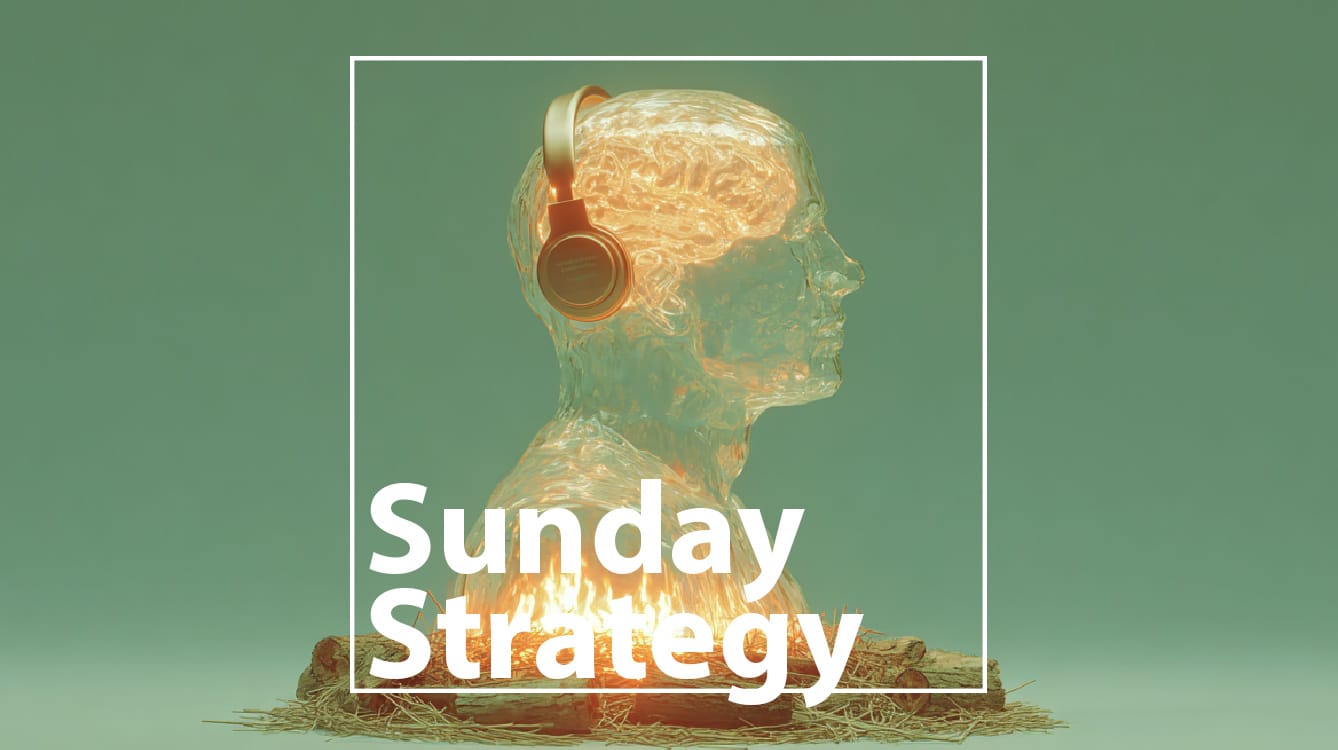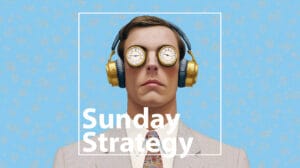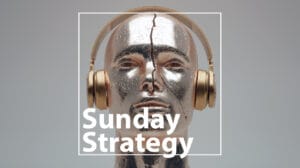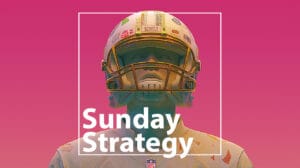In this issue of Sunday Strategy, we look at five stories to think about next week, including: a Defence of Thought (Leadership), Stopping ‘AI Slop’ as a Term, EOY Shopping Data, The Potential and Shortcomings of Digital Twins and Podcasting’s Female Host Issue.
In addition, we have ads from: Vans, Kitimat, Johnnie Walker, FIGS and Vodafone.
// Stories of the Week:
1.) In Defence of Thought (Leadership)
Is Creativity Dead? A new campaign in the UK for D&AD asks the question, and if it is – the culprits behind it might be the biggest issue. The campaign’s dual manifestos deftly highlight that creativity is simultaneously on its last legs and stronger than ever – a contradiction mirrored across the pages of the trade press and social feeds. Though the campaign deftly captures the Schrodiner-esque situation creative marketing finds itself in, its ‘death’ scenario lays the blame at the feet of inaction in a way that lumps ‘every person who wrote thought pieces instead of thinking’ and ‘every critic’ together with those who do nothing.
The separation of thought leadership from thought, and from creation, misses the point in a way that’s privileged at best and exclusionary at worst. It takes the sentiment of Michael Gove’s 2016 “people in this country (UK) have had enough of experts” line and refreshes it with amazing art direction for a contracting market.
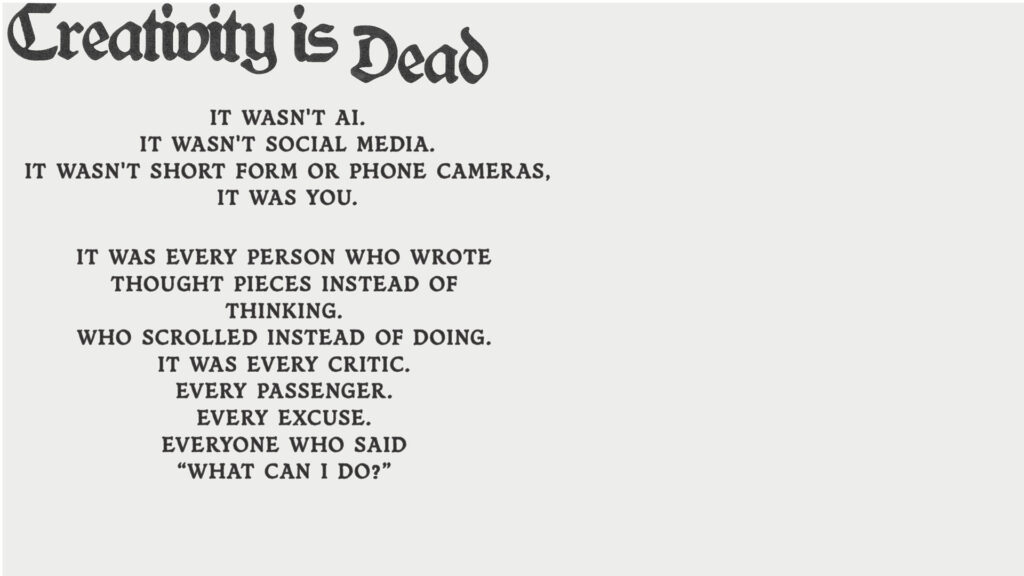

In a time where more people are freelancing, the industry is closing doors and juniors, across every strategic discipline, are trying to find ways to promote themselves to a challenging industry – ‘thought leadership’ is necessary. Most pieces may not be earth shattering (or even great), but it isn’t the enemy of creativity – it’s a sign of people trying to get a swing at being creative by putting more out in public. In the absence of a defined career ladder, the messy business of articulating yourself and learning from it has spilled over online. In an age of smaller agencies and freelance, it’s new business. It shows how you think through how you see the world.
Click-bait, rage bait and ill formed hot-takes on LinkedIn or Substack won’t kill creativity, they’re a sign of people desperate to remain close to it. The D&AD would be apt to remember that creativity doesn’t live or die for most, it goes further away. If inaction is truly the villain of creativity as claimed, writing something down is creative. Talking about work is creative. Critique is creative, even if we wish it wasn’t at times.
We can fight inaction, but what we can’t do is simultaneously judge what actions are valuable. When we do that – the D&AD, and other industry bodies like it, seem like a panel of those who’ve already made it vs. those still trying to.
2.) Is it Time to Bury ‘AI Slop’?
System1 and Jellyfish’s Tom Roach have published a new piece of research looking at the effectiveness of AI generated advertising. While the sample was small, results show that AI produced ads are increasingly able to exceed the testing averages of wider traditional ads, while also seeing only a third of respondents state ‘it looks digitally enhanced’. While the findings are more indicative than absolute for the industry, it does highlight the risk of dismissing AI advertising as ‘slop’ – with a rising ceiling showing, as the article below puts it – ‘enabling brands to make impossible ads possible’. There will always be ‘slop’, true (though potentially more expensive) for traditional ads as well as AI generated ones – but focusing on the worst AI output may miss the increasing potential of its best.
3.) Breaking Down Black Friday and Year End Sale Attitudes
New BCG research shows the increasing importance, and changing behaviors, around end of year sales like Black Friday, Cyber Monday and Singles Day. The research highlights that beyond the US, 70-90% of consumers globally plan to shop the sales and half have been searching for products since the beginning of November or earlier. Challenging the assumed impulse nature of sale shopping, BCG highlights that as holiday advertising has creeped into October, so has the beginning of product search.
4.) The Potential and Reality of “Digital Twins” in Research
What can ‘synthetic research’ help us understand faster than traditional research? A new study from Columbia conducts a mega-analysis on the potential of AI to create individual level ‘twins’ of real respondents. They compared human responses to those of digital twins (trained on each person’s answers to over 500 questions) across a range of studies and found that while the twins showed seemingly high accuracy (75%), they missed the nuance of humans on specific issues and performed no better than AI trained purely on demographic data alone (instead of nuanced survey answers).
The study shows that while digital twins show great potential in synthetic research, we should consider that ‘more data’ doesn’t necessarily mean ‘better accuracy’. Instead, considering what data sources can effectively prime AI twins and what use cases we’re comfortable deploying them in is key. Like all misused research (AI or human), we run the risk of confirming what we already know vs. uncovering true, authentic and less than obvious insights.
// Chart of the Week: Popular Podcasts’ Male Host Skew
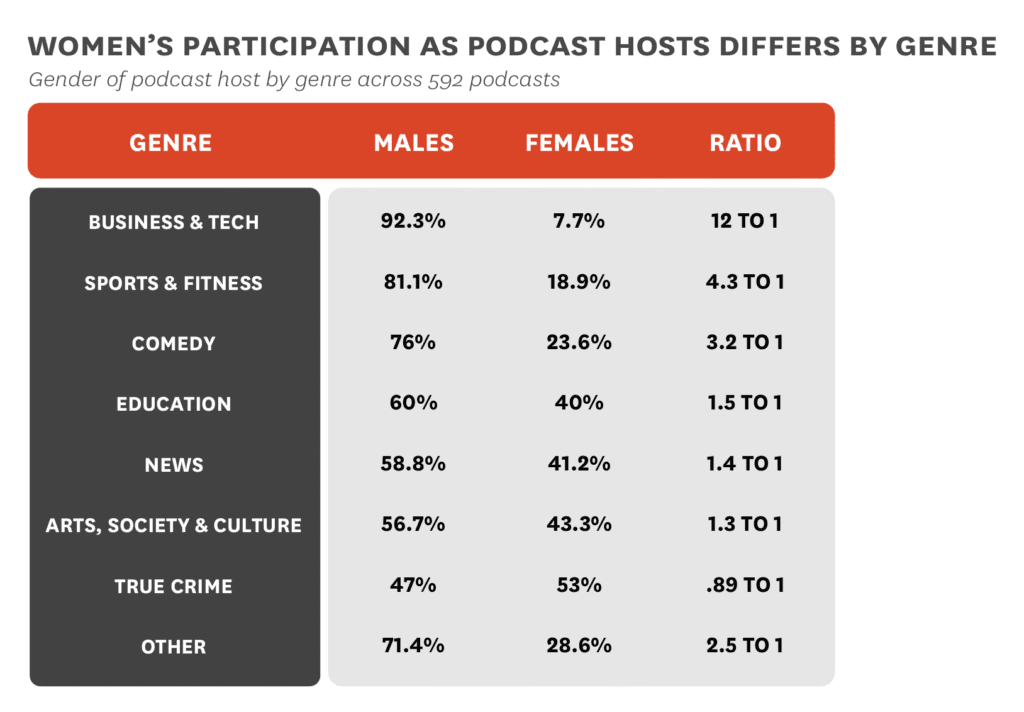

A recent study by the USC Annenberg School for Communication and Journalism shows lingering inequality in podcasts – with 33% of women as hosts on top 592 Spotify podcasts. In addition, of the guests on the top 100 podcasts only 27% were women. Across genres, only True Crime saw more female than male hosts, while popular business and technology podcasts featured a male to female host ratio of 12 to 1. While podcasting has been hailed as democratizing longer form storytelling and conversation, the skew towards male hosts in almost every genre creates a need for greater representation and an opportunity for media platforms and podcast advertisers.
// Ads You Might Have Missed:
1.) ‘Keep Being Weird’ – Vans:
Vans’ latest Brazilian work tackles self expression and individuality in and outside of the brand’s skateboarding heritage. Featuring Brazilian influencer and YouTuber Felca, its manifesto switches the dynamic of what’s ‘weird’ – from a label applied to those who stay true and do something different, to the fact that if you succeed, those who ostracise you quickly become supporters. The lo-fi ad approach and narrative twist trade in your face rebellion for a simple observation that feels relevant for many experiencing it.
2.) ‘It’s Not For Everyone’ – Kitimat, BC:
How honest can you be in a tourism or relocation ad? If you’re Kitimat, British Columbia – a town 650km from Vancouver – you’ve decided to make a virtue of oversharing. Much like Oysters, Kitimat claims it’s not for everyone, and that’s ok. For those that don’t mind trading proximity (to pretty much anything else) for vistas and views – the town makes a case for relocation. Coupled with a series of fake products, a three minute long tourism overshare challenges people to think about Kitimat in a way that evokes Helsinki’s ‘Who visits Helsinki in November’ ad. For both, it shows that when you have a hard reality to sell – leaning into those who still want to buy with the truth can be a good idea.
3.) ‘Keep Walking 2025’ – Johnnie Walker:
The heritage of a successful platform is simultaneously an asset and a risk for a brand. Considering how to update the platform to keep up with cultural shifts, while maintaining the essence of what made it great, is a good problem to have – but it is still a problem. Johnnie Walker has worked with this for years, successfully translating ‘Keep Walking’ to take a story of individual progress and apply it to friends, culture, countries and more.
However, its latest iteration of ‘Keep Walking’ may have walked a bit too far from the original idea of 25 years. ‘Keep Walking’ 2025 sees the brand focus strategically on the ‘keep’ in its platform, running ads which feature different actions alongside it – from ‘Keep Breathing’ to ‘Keep Dreaming’ and ‘Keep Searching’. While it aims to talk about ‘constant progress’ and ‘aspiration’, has the brand stretched the idea too widely? What it gains in breadth, it may lose in coherence and focus. In an attempt to make Johnnie Walker matter to more audiences and younger drinkers, it may risk spreading itself too thin. Whisky and even progress, might be special because it isn’t for everyone.
4.) ‘Wherever Your Holidays Happen’ – FIGS:
Scrubs brand FIGS has launched a Christmas ad that takes an optimistic tone to a challenging time for medical professionals. Set to the Pretenders’ ‘500 Miles’, the ad acknowledges the scheduling, surprise shift and increased injuries of the holiday season, while still showing how doctors, nurses and others get on with their duties around it – while still trying to live their wider lives and celebrate. Similar to previous lifestyle led activations, the ad strikes the balance between serious and absurd, professional and human, crisis and celebration that its users experience every holiday season.
5.) ‘Connecting You at Christmas Since 1984’ – Vodafone UK:
Vodafone UK has turned their Christmas ad into a brand heritage play, using the moment to highlight how it has connected consumers at Christmas since 1984. The ad, which features numerous iterations of mobile phones does nostalgia and heritage nicely, while creating a recurring role for the brand. What it loses in holiday charm, it makes up for in presence and highlights how a brand can use Christmas as a recurring moment, not a singular moment in messaging.
*For more holiday ads, check out our list of over a thousand ads from around the world, spanning from 2025 back to the 80s.*
// Sunday Snippets
// Marketing & Advertising //
– Nike combines herbal soup and running culture in a new pop up in Guangzhou [Sports]
– Aviation Gin launches a jingle to get football fans to stock up on Gin [Sports]
– Pet retailer BARK uses dogs and Gopros to make its chaotic Christmas ad [Pets]
– Gen Z dreams of Ralph Lauren Christmas, despite Dollar Store economic vibes [Christmas]
– Chinese luxury consumers are slowly coming back amid economic caution [Economy]
– The ATP unveils a new logo and brand identity for 2026 [Sports]
– Pepsi and Midwestern US pizza chain Casey’s (the fifth largest pizza chain the US) announce a partnership to extend Pepsi’s ‘Food Deserves Pepsi’ platform [Food]
– Taco Bell has created the Taco Bellt (a belt with a taco holster) to celebrate a Venmo partnership [Food]
– The split between CCO and CMO is rapidly becoming corporate fiction [Work]
– London’s Brick Lane painted yellow to celebrate the launch of Wicked: For Good [Movies]
– McDonald’s ‘Grinch Salt’ dill pickle fries are coming to the US [Food]
– Heinz launches limited edition ‘Leftover Gravy’ just in time for Thanksgiving [Food]
– Dutch Financial brand Centraal Baheer uses a streaming retiree to highlight the risks of not being ready for retirement [Finance]
– Bath and Body works is pumping pine scented fragrance into the NYC subway as a Christmas ad. No word if the existing aromas have combined to create a new take on the season. [Travel]
// Technology & Media //
– Google launches Gemini 3 – updating the capabilities of its flagship AI model [AI]
– Tesla looks to add Apple’s ‘Car Play’ to models in an attempt to increase sales [Auto]
– Indian AI challengers are leaning into language and cultural nuance to compete with OpenAI and others [AI]
– A new Qwen tech demo on Hugging Face shows how AI can take one photo and rotate it to new angles [AI]
– OpenAI have surprisingly added ‘Group Chats’ to ChatGPT, allowing you and friends to hang out with the AI [AI]
– Adobe to acquire digital marketing and SEO platform Semrush for $1.9 billion [Media]
– Rise at Seven’s ‘Multi-Channel Search Report’ shows Google now only accounts for 34.5% of Total Search volume [Media]
– Is the TV industry missing the point on Gen Z focused shows? [Television]
– The World’s first AI dating cafe, where people can take AI companions on a date, is opening in NYC this December [AI]
– Jack Dorsey brings Vine back, rebooted as diVine [Social Media]
// Life & Culture //
– Football club Birmingham City has unveiled plans for a new stadium that goes all in on the city’s industrial heritage [Sports]
– Is Timothee Chalamet secretly an anonymous British rap star? The internet has thoughts.Or is it just another part of the Marty Supreme marketing blitz? [Music]
– SKIMS and Cactus Plant Flea Market partner to release a surreal holiday collection [Fashion]
– Stone Island and New Balance partner on a new football boot and kit – putting a unique take on the sport’s culture [Sports]
– How did Under Armour’s sneaker business go off the rails? [Sports]
– Uber announces ‘Uber Ski’ taking skiers to the slopes in towns across the US and Europe [Travel]
– London phone thieves are so Apple centric, there’s a rumor they’ve returned a Samsung phone [Tech]
– The UK government announces plans to outlaw ticket resale above face value [Entertainment]
– An artist has swapped the traffic cone on top of Glasgow’s Duke of Wellington statue for a piece of pigeon art [Art]
– Are boyfriends embarrassing? Or is a better question why we’re letting others dictate our love lives? [Romance]
– How did the Quarter Zip catch on with a new crowd? [Fashion]
// Until Next Sunday
As always, let me know what you think by email (dubose@newclassic.agency), website or on LinkedIn.
You can also listen to an audio summary and discussion of each week’s newsletter on Spotify. We’re also on TikTok!

